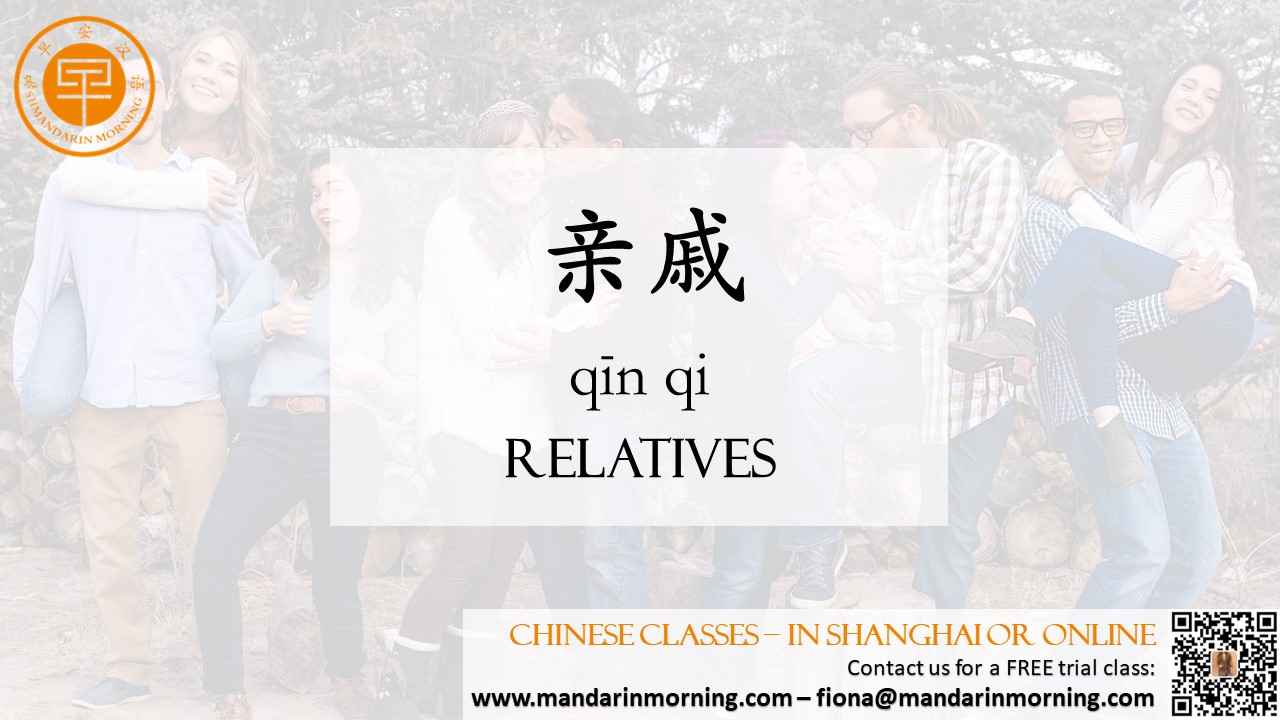| When it comes to extended family members, often referred to as 亲戚 (qīnqi; relatives) in Chinese, things start to get a bit more complex. We’ve classified the vocabulary words for referring to extended family members according to generation. First, let’s review family elders, that is, grandparents and those of the grandparenting generation, like mother-in-laws and father-in-laws.  奶奶 (nǎinai) - paternal grandmother 爷爷 (yéye) - paternal grandfather 外婆 (wàipó) - maternal grandmother 外公 (wàigōng) - maternal grandfather 公公 (gōnggong) - husband's father (father-in-law) 岳父 (yuèfù) - wife's father (father-in-law) 婆婆 (pópo) - husband's mother (mother-in-law) 岳母 (yuèmǔ) - wife's mother (mother-in-law) Next, on to the aunts and uncles, where terms of address can be notoriously confusing: 伯伯 (bóbo) - dad's older brother 叔叔 (shūshu) - dad's younger brother 姑夫 (gūfu) - dad's older sister's husband 姑夫 (gūfu) - dad's younger sister's husband 舅舅 (jiùjiu) - mom's older or younger brother 姑妈 (gūmā) - dad's older sister 姑姑 (gūgu) - dad's younger sister 伯母 (bómǔ) - dad's older brother's wife 婶婶 (shěnshen ) - dad's younger brother's wife 姨妈 (yímā) - mom's older sister 阿姨 (āyí) - mom's younger sister 舅母 (jiùmu) - mom's brother's wife 姐夫 (jiěfu) - older sister's husband 妹夫 (mèifu) - younger sister's husband 嫂子 (sǎozi) - older brother's wife 弟妹 / 弟妇 (dìmèi / dìfù) - younger brother's wife Let’s learn how to address cousins in Chinese next: 堂兄 (tángxiōng) - older male cousin on dad's side 堂弟 (tángdì) - younger male cousin on dad's side 堂姐 (tángjiě) - older female cousin on dad's side 堂妹 (tángmèi) - younger female cousin on dad's side 表哥 (biǎogē) - older male cousin on mom's side; sometimes also older male child of dad's sister 表弟 (biǎodì) - younger male cousin on mom's side; sometimes also younger male child of dad's sister 表姐 (biǎojiě) - older female cousin on mom's side; sometimes also older female child of dad's sister 表妹 (biǎomèi) - younger female cousin on mom's side; sometimes also younger female child of dad's sister In spite of the detailed variations in the terms of address used for cousins, you should be aware that it is common to hear Chinese people, particularly children or young adults, refer to their cousins as their brothers or sisters by using the terms 哥哥 (gēge),弟弟 (dìdi),妹妹 (mèimei) or 姐姐 (jiějie), based on their relative age and gender. In Chinese, nieces and nephews are also referred to according to gender, as well as their position on the paternal versus the maternal side of the Chinese family tree: 侄女 (zhínǚ) - brother's daughter 外甥女 (wàishengnǚ) - sister's daughter 侄子 (zhízi) - brother's son 外甥 (wàisheng) - sister's son |